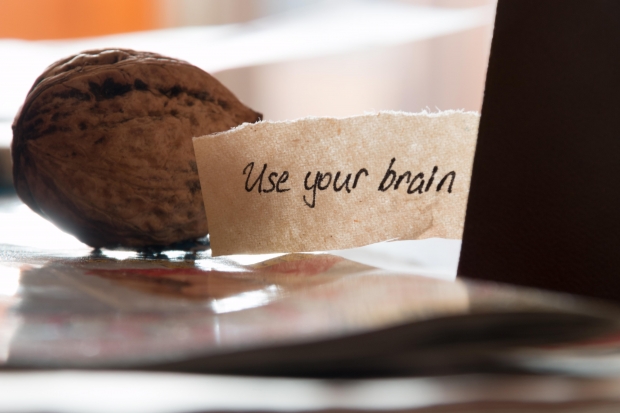
Nutritional Neuroscience: How nutrition affects our brain’s ability to change
As societal expectations rise, so does competition and stress. Hard work, efficiency, tenacity and results are rewarded and we usually justify the stress, anxiety and depression involved because we think we have achieved success. In 2014, an estimated 40 million Americans were affected by an anxiety disorder, including depression [1].
Today, we often treat mental disturbances with drugs (SSRIs, MAOIs, SNRIs, tranquilizers, benzodiazepines etc.). These medications are powerful, and if administered correctly, they work. But at what cost? Usually a large amount of trial and error is necessary to get the right drug or combination of drugs for the treatment of depression or anxiety. This experimentation with our brain’s physiology is extremely unpleasant, to say the least. There are many different categories of anti-depressants because everyone reacts and responds differently.
 Once the correct dosage, medication type, and combination are found, the results can be life changing. More often than not, however, these medications come with side effects including nausea, insomnia, increased appetite and weight gain, blurred vision, agitation, irritability, fatigue, erectile dysfunction, loss of orgasm and an overall decrease in libido. The individual must weigh the benefits with the risks. Some people only use the medication in acute situations. Other chronic sufferers may choose to be on the meds for the rest of their lives.
Once the correct dosage, medication type, and combination are found, the results can be life changing. More often than not, however, these medications come with side effects including nausea, insomnia, increased appetite and weight gain, blurred vision, agitation, irritability, fatigue, erectile dysfunction, loss of orgasm and an overall decrease in libido. The individual must weigh the benefits with the risks. Some people only use the medication in acute situations. Other chronic sufferers may choose to be on the meds for the rest of their lives.
If someone has been on medication for a lengthy amount of time and decides that the side effects are too much (or they simply believe they don’t need the medication anymore), coming off the drugs can be extremely difficult. Ironically, those who respond the best to medication (chronic depression and anxiety sufferers), have the hardest time coming off the treatment.
Discontinuation syndrome, aka serious withdrawal, can be absolutely debilitating. Even under a supervised taper, the symptoms can have an enormous impact on daily life. The symptoms common with withdrawal often result in the individual choosing to go back to medication. Vomiting, brain and full body “zaps,” seizures, flu-like symptoms, depression, insomnia and suicidal thoughts are just a few of the symptoms common with anti-depressant discontinuation syndrome.
The point is not to persuade you one way or another when it comes to treating depression with medications. If medication works for you and you are happy, then by all means continue! With or without medication, a nutritional approach to mental health can be implemented.
Neuroplasticity is the brain’s ability to reorganize pathways, connections and behaviors in response to new information [2]. It was originally thought that the brain cells we are born with are the brain cells we will die with. The exciting field of neuroscience has discovered that this is simply not the case. Our brains are incredibly plastic, meaning they can change and rewire synaptic connections. Our brains are, in fact, not hard-wired. This offers valuable insight for addressing learning, memory and mood.
Neuroplasticity has enormous implications for people suffering from affective or mood disorders, including depression and anxiety. If we are able to effectively “rewire” our neural circuits, we may be able to greatly reduce periods of acute or chronic depression in our lives. Likewise, anxiety will also decrease.
So what does this have to do with nutrition?
Well, we usually only think of the physical impact a healthy diet has on our bodies but over the years it has become accepted by the scientific community that diet is also a key component for optimal neural functioning. This research has been dubbed “nutritional neuroscience” and it has drawn significant attention. A plethora of peer reviewed studies exist on the subject and more are being published every year.
Brain-Derived Neurotrophic Factor (BDNF)
BDNF is a neurotrophic protein which codes for growth factors. Huh? Basically, this is a protein that enhances learning, memory and mood when released by the hippocampus in response to neural synaptic activity. It is believed that behavior is controlled at the synapse (where neurons meet to pass signals) and that BDNF facilitates this connection. Because proper neural cell signaling in the hippocampus relies on BDNF, it should come as no surprise that low levels of BDNF have been associated with poor learning, performance and increased depression [4].
Certain dietary nutrients aid in our brain’s ability to form new connections and to rewire existing ones. This brings the idea of neuroplasticity and depression full circle; from diet, to neural connections, to decreased anxiety and depression and back to a healthy diet. See where this is going?
What are the nutrients and how do we incorporate them into our diets?
Essential Fatty Acids (EFAs)
Docosahexanoic acid (DHA), an omega-3 fatty acid, makes up about 31% of the fatty acids in the brain’s prefrontal cortex, aka the grey matter. DHA is an omega-3 fatty acid that our bodies cannot synthesize, therefore we must get it from our diet. Insufficient DHA affects our neural cell membranes, serotonin transport, gene transcription, inflammation and energy metabolism in the brain [4].
We are consuming way more omega-6s than omega-3s, which is causing a major imbalance in our brains (among other things). The ideal ratio of omega-6s to omega-3s is 1:1. Today, that ratio is closer to 20:1, with omega-6 fatty acid intake far surpassing that of omega-3s. But we need omega-6s, right? Yes, in the right proportion. To restore this ratio we must consume less vegetable oils (safflower, grapeseed, sunflower, corn and soybean oils), shortening, mayonnaise, fried foods and vegetable oil based salad dressings. Foods we should consume more of to boost our omega-3 or DHA intake include
- flaxseeds
- walnuts
- chia seeds
- sardines
- wild-caught salmon
- algae and seaweed
- soybeans (not soybean oil)
- eggs
- cod liver oil and other fish oils
- grass-fed beef
Currently there is no dietary reference intake (DRI) for omega-3 fatty acids, yet the World Health Organization recommends a daily DHA (and EPA) intake of 0.3-0.5 grams and a daily ALA intake of 0.8-1.1 grams.
Choline
Serotonin has always been the main focus for those suffering from depression although recent research is suggesting that serotonin-centric therapy may only be treating the problem and not the cause. Dr. Marina Picciotto at Yale University has found that acetylcholine disruption may be a primary cause of depression [5]. Acetylcholine is a neurotransmitter which, in the central nervous system, is involved in learning, memory and mood. Research has found those with depression have a higher concentration of acetylcholine in the brain. Interesting.
It wasn’t until 1998 that the National Academy of Sciences determined choline to be a required nutrient. Dietary choline is essential for normal brain development. Specifically, choline plays an important role in memory in the hippocampus because it aids in the methylation process. Methylation is required for proper cell signaling and neuroplasticity. A choline-deficient diet has been shown to impair growth, memory, hepatic, renal and pancreatic function in mammals [6]. It is known that choline is important for cognitive function yet its effects on emotional health are just beginning to be studied. So far a correlation between choline deficiency and high anxiety has been found (an inverse relationship).
While research is ongoing, getting adequate dietary choline (though not in excessive amounts) may be beneficial. You will find choline in
- organic egg yolks
- grass-fed meat and liver
- wheat germ
- soy beans
- peanuts
The DRI/RDA for choline is 375-550 mg/day for adult males and 375-425 mg/day for females.
B Vitamins
Folate and vitamin B12 may play a key role in neural health. Studies have found that depressed people tend to have low serum folate and B12 levels [7].
Homocysteine is an amino acid that, when levels are elevated, is known to be a precursor to heart disease and mood disorders. Vitamin B12 is a key component in the homocysteine methylation cycle. Without it, homocysteine is able to build-up and place stress on the body’s metabolic processes.
Other studies have failed to find a connection between folate, B12 and mood disorders but that’s not to say there isn’t one. Ensuring adequate dietary folate and B12 has well-established benefits and the possibility of improved mental health is just one more reason to give these nutrients a little love and attention.
You will find folate and B12 in
- dark leafy greens
- asparagus
- broccoli
- citrus
- avocado
- beans, peas, and lentils
- seeds and nuts
- squash
- beets
- mackerel
- sardines
- salmon
- nutritional yeast (the beloved “nooch”)
The RDA for folate for adult males and females is 300-400 μg/day (600 μg/day during pregnancy). The RDA for B12 for adult males and females is 1.8-2.4 μg/day.
Similar to ensuring optimal physical health, eating a well-balanced, nutrient-dense diet will also impact your mental health and wellbeing. These are a few of the nutrients that are gaining more attention for their potential mental health benefits.
How does this fit into brain plasticity?
In order to begin working on “rewiring” your brain, you must begin with a solid foundation. Beginning with a nutritional approach is a great starting point as it provides your neurons with the “tools” necessary to make new connections.

Cognitive behavioral therapy, a change in perspective and outlook, meditation, exercise, sleep hygiene, stress reduction and facing your fears will all change the connections in your brain. Brain imagery equipment has demonstrated this by literally showing the activation and deactivation of certain areas of the brain and actual neural tissue growth (especially in the hippocampus). Unlike the reductionist approach taken by many healthcare providers today, nutrition and behavioral therapy encompasses the whole body and being.
This is extremely promising news and has great implications for those suffering from depression and anxiety. As mentioned before, you can focus on nutrition while still taking your medications. You can work towards rewiring your brain while still undergoing allopathic treatment.
It is, of course, entirely up to you whether you choose to continue with a medicated approach but now hopefully you are inspired to rethink, so to speak, your mental health. Maybe you are fortunate enough to not suffer from chronic anxiety and depression, in which case perhaps you will pass this information on to someone who does.
Love and light,
Renee
Disclaimer: I am not a mental health professional, psychologist, or psychiatrist; therefore please consult an appropriate professional before making any changes to your diet and treatment plan.
[1] Facts & Statistics | Anxiety and Depression Association of America, ADAA. (2014, January 1). Retrieved January 27, 2015.
[2] Cramer, S. C., Sur, M., Dobkin, B. H., O’Brien, C., Sanger, T. D., Trojanowski, J. Q., … Vinogradov, S. (2011). Harnessing neuroplasticity for clinical applications. Brain, 134(6), 1591–1609. doi:10.1093/brain/awr039
[3] Arden, J. (2010). Rewire your brain: Think your way to a better life. Hoboken, N.J.: Wiley.
[4] Gomez-Pinilla, F. (Director) The ability of nutrients to promote brain plasticity and cognitive health. Lecture conducted from NIH and Institute of Medicine, UCLA. Departments of Neurosurgery and Integrative Biology and Physiology.
[5] Picciotto, M. (2013). Potential Root Cause of Depression Discovered by NARSAD Grantee. Brain and Behavior Research Foundation. Retrieved January 27, 2015, from https://bbrfoundation.org/discoveries/potential-root-cause-of-depression-discovered-by-narsad-grantee
[6] Bjelland, I., Tell, G., Vollset, S., Kontstaninova, S., & Ueland, P. (2009). Choline in anxiety and depression: The Hordaland Health Study1,2,3. The American Journal of Clinical Nutrition, 90(4), 1056-1060.
[7] Bjelland, I., Tell, G., Vollset, S., Kontstaninova, S., & Ueland, P. (2009). Choline in anxiety and depression: The Hordaland Health Study1,2,3. The American Journal of Clinical Nutrition, 90(4), 1056-1060.
0

I LOOOOVE your science-y posts 😉 thanks for sharing all this info, I’m all set to do some experimenting now. Have you any knowledge of herbs? Ayurveda and TCM also have advice for dietary management of depression/anxiety.
Hey! Thank you! I wonder sometimes if my science-brain bores people… I’m actually learning about the chemistry behind herbal medicine in one of my classes right now. Super amazing stuff! Thank you for the Ayurveda and TCM tidbit. Admittedly, I haven’t delved too much into TCM for mental health, though what I have seen agrees with many natural health approaches.
Thank you for your comment!
Renee